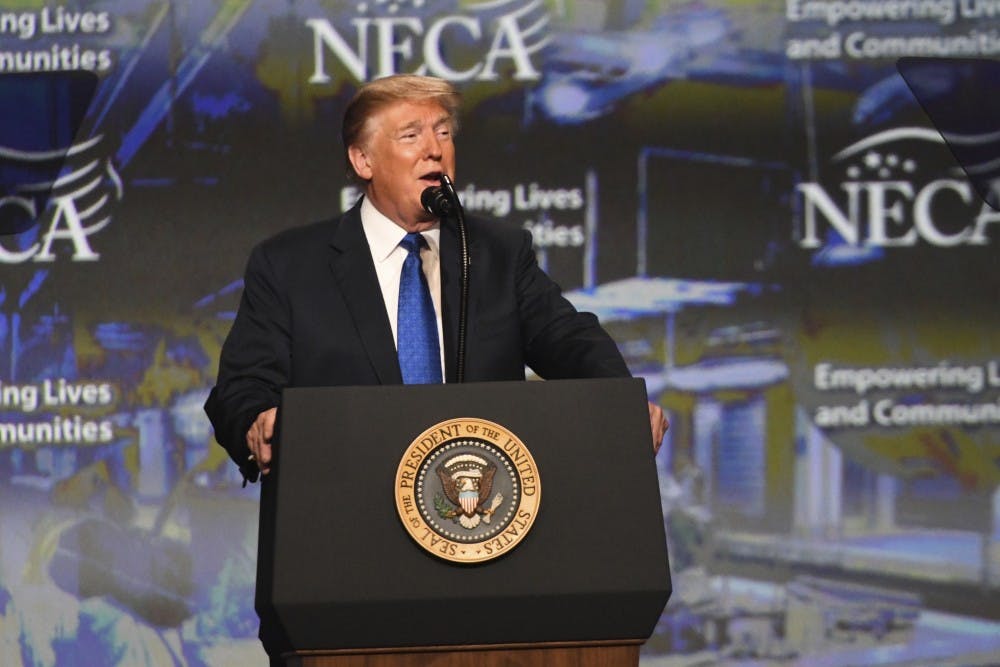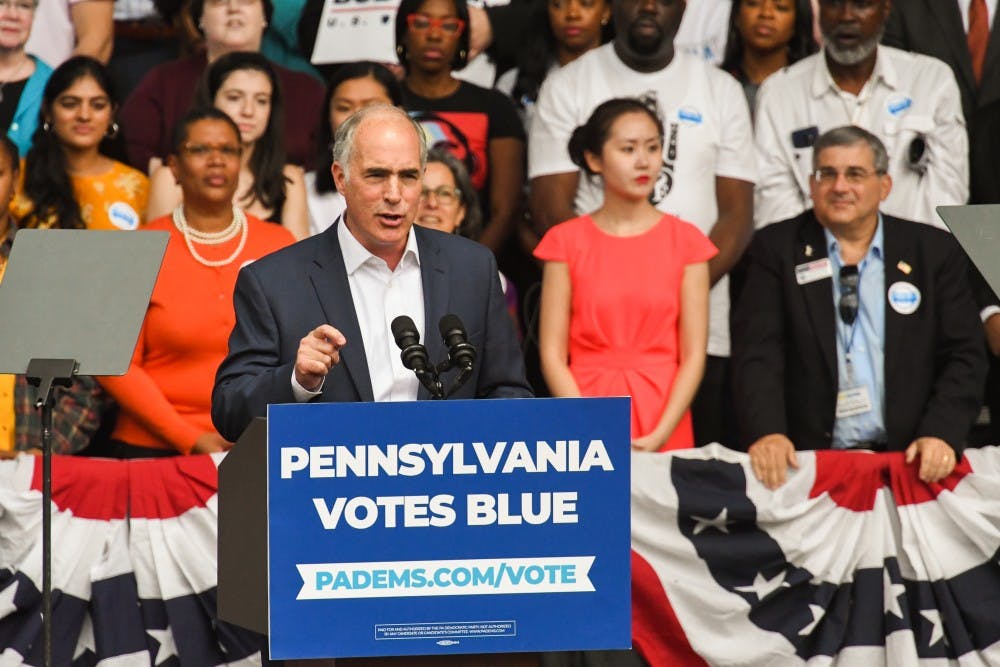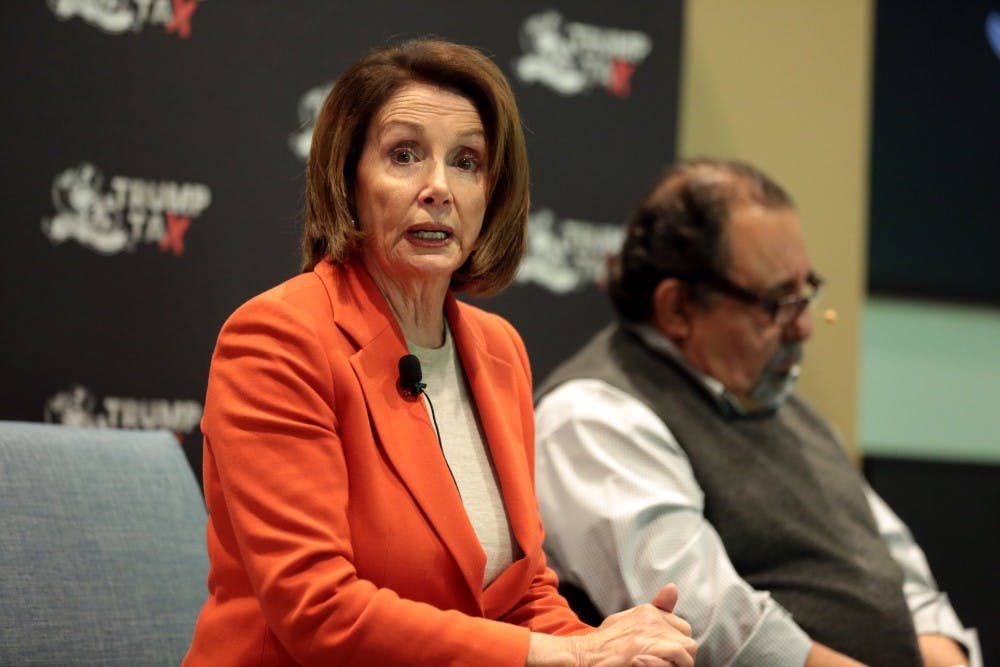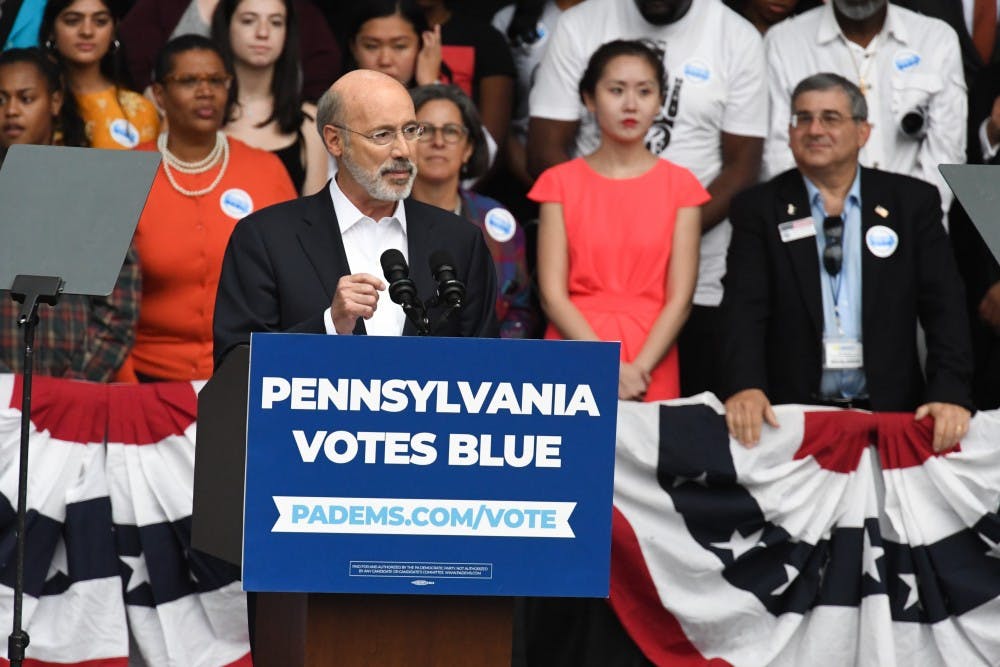President Donald Trump labeled the midterm elections “one of the most important of our lifetime.” New Jersey Senator Cory Booker (D) called them “the most important election of our lifetime.” Trump's former lawyer Michael Cohen said these midterms “might be the most important in our lifetime.”
Much is at stake come Nov. 6 — Republicans could lose control of both houses of Congress, Democrats could gain an opportunity to launch investigations into the Trump White House, and on local levels 87 of the 99 state legislature chambers and 36 governorships could turn over.
The fallout from the elections will affect Penn in a variety of ways, from Supreme Court decisions that could spell the end of affirmative action to higher education laws that change the way financial aid is distributed.
Most recently, a lawsuit has alleged Harvard discriminates against Asian-American applicants, which could put Penn's affirmative action rules at risk. As it stands, Penn Dean of Admissions Eric Furda says while many factors — such as grades, recommendations, and "background and experiences" — are considered in the admissions process, Penn does "not discriminate against any racial, religious, ethnic or other group of applicants."
A change in control of Congress could also impact the future of Republican-proposed legislation aimed at shifting financial aid funding from private universities in the Northeast like Penn to community colleges or for-profit institutions.
In late 2017, the Promoting Real Opportunity, Success, and Prosperity through Education Reform Act passed committee in the GOP-controlled House, yet such a bill would suffer in a Democratic chamber.
"In every election I've ever covered going back almost 30 years, politicians have always said this is the most important election of our lifetime," Dick Polman, WHYY political columnist and Penn writer-in-residence, said. "It's kind of become a cliche — but this one really is."
With over a dozen battleground states at play, voters will have a chance to respond in the first national election since the Wharton 1968 graduate won the White House two years ago.
As Penn students get ready to head to the polls, The Daily Pennsylvanian breaks down what’s at stake in the midterm elections through four key categories: the Senate, the House of Representatives, governorships, and national civil discourse.

Senate: the battle for the future of the judiciary
There are 35 Senate seats up for grabs on Nov. 6, and with Republicans enjoying the slimmest of majorities in the 51-49 current split, many experts view the senatorial elections as extremely consequential.
The Senate has the power to confirm presidential nominees such as Supreme Court justices, a process that was recently at the forefront of national discussion after this month's successful and controversial battle to confirm Justice Brett Kavanaugh. Two years into his presidency, Trump has already successfully appointed two conservative justices to the Supreme Court and experts project he may have additional nomination opportunities in the coming years.
“The Senate is important because key parts of the U.S. Constitution mandate that the Senate is a check on key elements of presidential power,” Dan Hopkins, Political science professor and contributor to FiveThirtyEight, said. “We saw this with Judge Kavanaugh and the very recent nomination for the Supreme Court, but we also see this on treaties and judges not just for the Supreme Court, but throughout the federal judiciary.”
Following the confirmation of Justice Kavanaugh, experts said that the future of affirmative action was in doubt, and more conservative judges on the Supreme Court would increase the likelihood that the practice is banned from college admission policies at universities like Penn.
The lawsuit against Harvard's admissions policies is currently ongoing, with the fate of affirmative action policies in the Ivy League still unclear.
Penn Dean of Admissions Eric Furda has maintained Penn will keep its affirmative action rules until legislation forces the University to amend its policy.
"I think the basic tenet here needs to be that we’re going to follow the law,” Furda said in September. “And until the law changes, we’re going to do what we feel has been legal, ethical, and in the educational benefit of all of our students.”

Following the confirmation of Justice Kavanaugh, experts said that the future of affirmative action was in doubt.
Democrats face an uphill battle to win control of the chamber, as 10 Democratic senators are up for re-election in states won by Trump in 2016. One of those is Pennsylvania’s Democratic senator Bob Casey, who is running against Republican challenger Lou Barletta.
Penn Democrats President and Wharton junior Dylan Milligan said that Bob Casey's re-election is vital in order to provide a check on Trump's power and to combat conservative judges.
“We saw how important the Senate was in the Kavanaugh hearings,” Milligan said. “We need to re-elect Bob Casey for that reason: Judicial nominations and the entire Trump legislative agenda are all going to be able to be stopped by the Senate.”
Most election experts favor the Republicans to maintain control of the Senate, Hopkins said, with FiveThirtyEight’s model giving the GOP a four in five chance to keep the chamber. For Republicans on Penn’s campus, losing control of the Senate would mean granting Democrats free rein on attacking the president’s agenda.
“If the Democrats take over the Senate, they will try to block potential future Supreme Court nominees, and I think it will lead to a lot of obstruction,” said College Republicans Political Director Danielle Yampolsky, a Wharton junior. “They’re the party of anti-Trump and they don’t have any policy ideas or plans — whatever Trump says they do the opposite.”

House of Representatives: the opportunity to investigate Trump
Experts say Democrats will have their biggest opportunity to provide a check on Trump’s power in the House of Representatives — where all 435 seats are up for election. FiveThirtyEight predicts there is around an 85 percent chance Democrats win a majority in the House. They need a 24-seat net gain to win control.
With a majority in the House, Democrats would be able to investigate alleged abuses of power within the White House, Hopkins and Milligan noted.
“If the House of Representatives were to flip to the Democrats, we would see a very different kind of approach to the president,” Hopkins said. “We would see more by way of congressional investigations of alleged presidential administration misdeeds and more emphasis on investigations of the current administration.”
Milligan added that a Democratic majority in the House would give the party chairmanship in every committee – including the House Oversight Committee and House Intelligence Committee — and greater power to subpoena the administration.

Political science professor Marc Meredith noted there was also a good chance impeachment proceedings against Donald Trump could start under Democratic control, but said it was unlikely such measures would be successful.
The midterm could lead to a potentially split Congress with a GOP Senate and a Democratic House, which College Republicans worry would lead to further gridlock and harm the political process.
“Democrats have run on an obstructionist platform, I think that’s their goal and obviously it’ll help them,” Richard Murphy, Interim President of College Republicans and College senior, said. “It can’t hurt them in their goal to obstruct Trump, but it could hurt the country — nothing would get done and essentially we would not go forward at all for another two years.”
For Penn students, a divided Congress could reduce the chances that Republican proposed-acts regarding higher education policy would be signed into law.
In 2017, House Republicans tried to pass the Promoting Real Opportunity, Success, and Prosperity through Education Reform Act. The PROSPER Act would eliminate key federal education grant programs.
Employees from Penn's Financial Aid department lobbied against the bill, which passed the House Committee on Education and the Workforce in December 2017, but has not been discussed or voted on by the House.
A Democrat-controlled House of Representatives would be unlikely to advance the PROSPER Act in the next Congress, safeguarding federal programs that assist students who demonstrate exceptional financial need.

Democrats, under the potential leadership of Nancy Pelosi, could start impeachment proceedings against Donald Trump if they take control of the House. Penn Political Science professor Marc Meredith said it was unlikely such measures would be successful. (Gage Skidmore | CC BY-SA 2.0)
Governorships: where states see the most change
With the increasingly nationalized political environment, Hopkins said many local races can often fly under the radar in election cycles. For Hopkins, many of the most important elections are not happening for the Senate or the House, but for the governorships across the country.
“I would argue the single most consequential offices on the ballot are the 36 governor races that are up around the country,” Hopkins said. “Some of the most immediate changes in policy that you will see coming out of this election will come in cases where the governor has changed hands.”
Hopkins cited influential governors’ elections occurring in states such as Wisconsin, Florida, Kansas, and Georgia — all states Trump carried two years ago that have competitive midterm races.
In addition, Pennsylvania’s Democratic governor, Tom Wolf, is running for re-election against Republican Scott Wagner, a race that Milligan has prioritized due to the Republican majorities in the state legislature.
“Pennsylvania Republicans been trying to cut down on women’s right to choose, but it’s all been vetoed by Wolf,” Milligan said. “We need to re-elect a champion for reproductive rights such as Wolf, sort of the check to what I believe is the ultra-right Republican majority in the state House and state Senate.”

National political discourse: will the war of words continue?
During the contentious midterm season, the country has seen an increase in aggressive rhetoric from both sides of the aisle.
Many conservatives have seized on the words of Rep. Maxine Waters (D-Calif.), who in June urged activists to show Trump administration officials “they’re not welcome anymore, anywhere.”
“The Democrats have essentially enforced and normalized a kind of mob politics,” Murphy said. “You’ve seen a loss of civility, and essentially what we’ve seen is a desire to get power at all costs and to use the mob if necessary.”
Democrats have also identified a shift in the national political discourse. Recently, Republican nominee for Pennsylvania governor Scott Wagner recorded a Facebook video where he pledged to "stomp all over" Democrat Tom Wolf's face.
Weisman said Wagner's threat, as well as Donald Trump's offers to pay for legal fees of supporters who beat up protestors at his rallies, indicate a negative shift in messaging from the GOP.

"It really just shows you what the Republican party is now — they have done so much damage to our political culture in the last few years," Weisman said. "It's shocking to see comments like that from the Republican nominee for governor of Pennsylvania, but it's consistent with what that party is doing right now."
Meredith categorized both parties' accusations as "whataboutism," which is when one side highlights their opponent's objectionable actions while downplaying their own offenses.
"I think it's really going to be hard for discourse to improve while Trump is in the White House," Meredith said. "Because of whataboutism, any time Democrats get called out for some discourse, they are going to point to Trump and say 'What about Trump?'"
Will the midterms result in any meaningful improvement from the current political war of words?
Meredith isn't so sure: "I'm not very optimistic as long as Trump is in the White House that you're going to be able to deal with issues of discourse."
Looking forward
While some experts claim this Nov. 6 election will be the most important in recent memory, the outcome and resulting implications are sure to dominate the national conversation in the coming weeks.
But anyone who thinks the results are already a sure bet is sorely mistaken, Meredith said.
"Anyone who tells you they know what's going to happen in this election is full of it," Meredith said. "There's still a real chance Democrats take the Senate and there's still a real chance Republicans take the House. There's less certainty about what's going to happen than many people are thinking."
The Daily Pennsylvanian is an independent, student-run newspaper. Please consider making a donation to support the coverage that shapes the University. Your generosity ensures a future of strong journalism at Penn.
Donate




Most Read
Penn Medicine pauses pilot grant programs, citing federal funding uncertainty
Penn freezes hiring, cuts spending in ‘proactive’ response to federal funding uncertainty
Penn professors join hundreds to protest research funding cuts at Phila. Stand Up for Science rally
More Like This